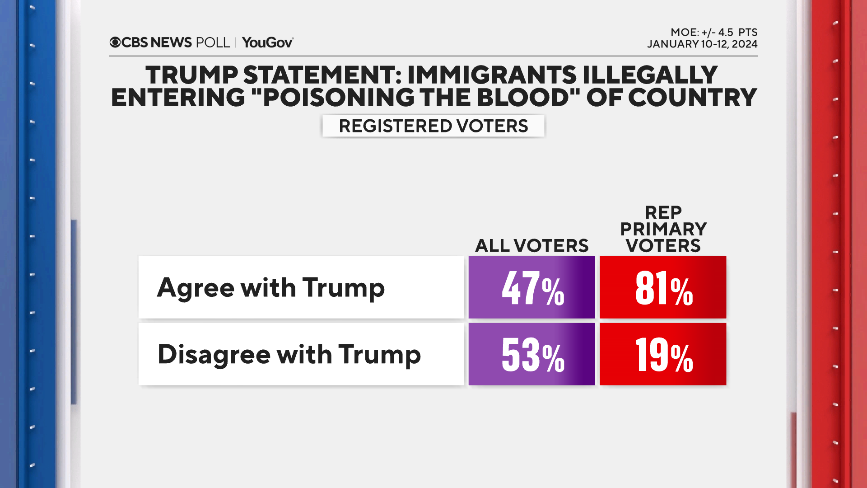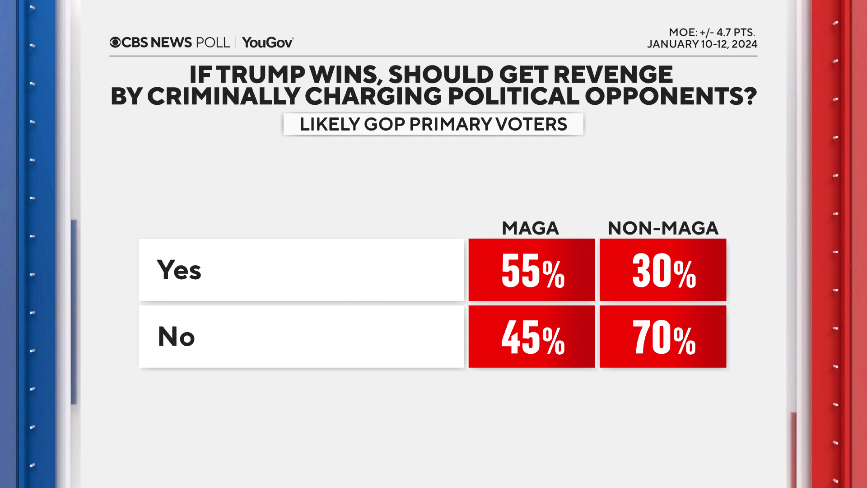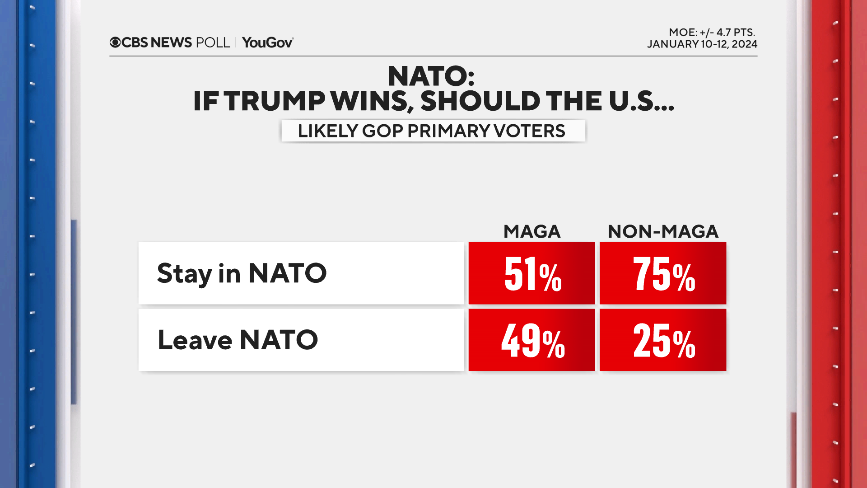Donald Trump’s support among national Republican primary voters has now risen to its highest level yet.
His legal issues obviously haven’t hurt his standing with primary voters and some of his recent controversial statements resonate with many GOP and “MAGA” voters.
Republican voters continue to believe Trump is their best bet to beat Joe Biden in November, even as Nikki Haley leads Joe Biden by a wider margin in a general election match-up than either Trump or Ron DeSantis. We show why in this analysis.
Some of his rivals have asserted that Trump’s ongoing legal issues could hurt his chances in the general election, but Republican voters still view him as their best chance to beat Biden, and as far as the general goes, it actually makes some of these Republicans want to show support for him.
And while Nikki Haley’s perceived electability continues to grow, her numbers are just nowhere near Trump’s.
Do Trump statements and MAGA ideas resonate in the wider GOP electorate?
Republican voters want a candidate who’d promise tax cuts — a long-standing call in the GOP — and challenge woke ideas, which has been a consistent call in this campaign.
But then there are other ideas and statements the frontrunner has made of late that have brought criticism from Trump’s political opponents.
On immigrants: One of those is his use of the phrase “poisoning the blood of the country” when describing immigrants who enter the U.S. illegally. While most voters overall disagree with this language, eight in 10 Republican primary voters say they agree with it — and that includes majorities of both MAGA voters (97%) and non-MAGA voters (65%) in the GOP electorate.
Other ideas divide Republican primary voters — sometimes along MAGA/non-MAGA lines.
Perhaps just as importantly, several of these ideas and statements are not disqualifying: even if Republicans disagree with Trump on these items, most are still backing him for the nomination.
Here are some examples:
On revenge or payback: Most MAGA voters want him to prosecute his opponents if he’s elected, while few non-MAGA primary voters do. That said, six in 10 Republican voters who don’t want Trump to do this are still backing him.
On relations with allies: Half of MAGA voters would have him take the U.S. out of NATO, with most other GOP primary voters opposed. But Trump enjoys wide leads among both groups, regardless of their support for NATO.
On loyalty in government: There’s less support for ideas like removing federal workers who aren’t Trump supporters; almost no one wants government officials to show loyalty to Trump over the U.S. Constitution, and there’s little backing for the idea of punishing media organizations that criticize him. Most MAGA voters don’t sign onto these either. But again, Republican voters are overwhelmingly voting for Trump, regardless of their position on each of these items.
And voters do tend to think Trump means what he says.
Can anything change from here?
Trump’s support is both large and solid, more so than any other GOP candidate. Most who back Trump say they won’t change their minds, and he continues to enjoy a solid “floor” under that support from voters considering only him and no one else.
Trump’s challengers are hoping individual state performances will change this dynamic, of course, though most national voters say Iowa and New Hampshire’s results won’t factor into their decisions.
That said, persuading Trump backers to change their minds now looks like an uphill climb. Trump voters who are at least considering someone else look pretty similar to Trump-and-only-Trump voters on a variety of attitudes. They want to hear candidates talking about similar issues: the economy and the border. They express similar preferences about what the candidate does: most importantly, promising tax cuts, challenging “woke” ideas, and banning surgeries that change a child’s gender. And even those considering another candidate tend to say their support for Trump is “very strong” and that he has the best chance of beating Mr. Biden.
There is at least one thing missing for Republican primary voters: They want to hear their candidates talking a lot about the economy, but most don’t feel that’s been happening.
This CBS News/YouGov survey was conducted with a nationally representative sample of 2,870 U.S. adult residents interviewed between January 10-12, 2024, including 786 likely Republican primary voters. The sample was weighted according to gender, age, race, and education based on the U.S. Census American Community Survey and Current Population Survey, as well as past vote. The margin of error is ±2.5 points for the sample overall and ±4.7 points for likely Republican primary voters.










